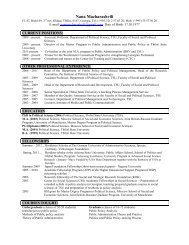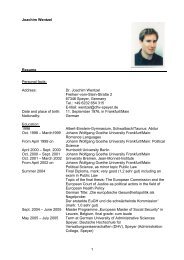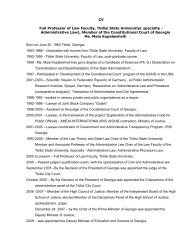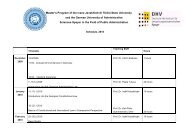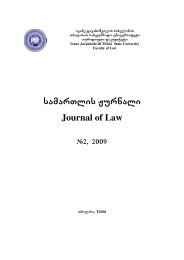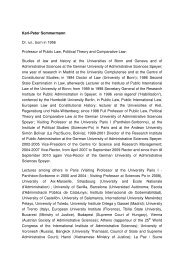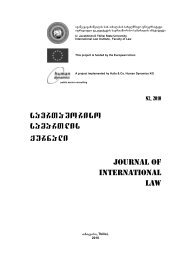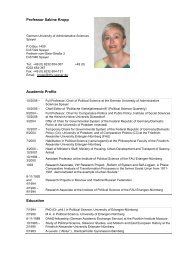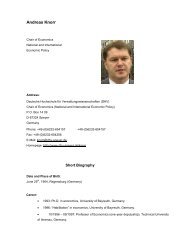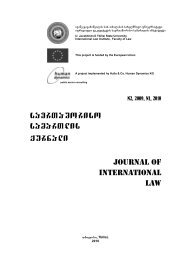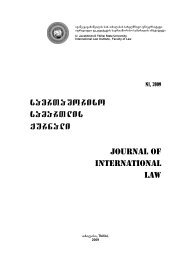Untitled
Untitled
Untitled
Create successful ePaper yourself
Turn your PDF publications into a flip-book with our unique Google optimized e-Paper software.
NONA KALANDADZE<br />
INTERNATIONAL CONVENTION ON THE PROTECTION OF THE RIGHTS OF<br />
ALL MIGRANT WORKERS AND MEMBERS OF THEIR FAMILIES AND UN<br />
MONITORING MECHANISMS FOR THE PROTECTION OF THE RIGHTS<br />
OF MIGRANT WORKERS AND MEMBERS OF THEIR FAMILIES<br />
INTRODUCTION<br />
Labour migration is a very important aspect<br />
of globalization and an expression of the<br />
processes of international integration. It has<br />
rapidly accelerated in the aftermath of World<br />
War II. It was reasoned by current political and<br />
economic processes, normalization of the relations<br />
among the countries, reinforcement of<br />
political, labour and social rights of aliens on<br />
the one hand and facilitation of communications<br />
between the different States, reduction<br />
of transportation prices and increase of the<br />
level of awareness of the population on the<br />
other hand.<br />
The collapse of the socialist system had a<br />
great impact on the migration trend of the<br />
world. The rapid deterioration of living standards<br />
and increasing political instability generated<br />
new waves of migrations. The development<br />
of migration from Georgia was equally<br />
affected and determined by economic collapse<br />
and the newly emerging trends of labour<br />
force supply and demand on the domestic,<br />
as well as international labour market.<br />
For the first time its serious interest has<br />
been expressed by the Organization of United<br />
Nations in 1972, since the Economic and<br />
Social Council in its resolution 1706 (LIII) expressed<br />
alarm at the illegal transportation of<br />
labour to some European States and at the<br />
exploitation of workers from some African<br />
States "in conditions akin to slavery and forced<br />
labour”. Later the same year, the General Assembly<br />
in its resolution 2920 (XXVII) condemned<br />
discrimination against foreign workers<br />
and called upon Governments to end such<br />
practices and to improve reception arrangements<br />
for migrant labours. 1<br />
International Convention on the Protection<br />
of the Rights of All Migrant Workers and Members<br />
of Their Families was adopted by the UN<br />
without the ballot in 1990. 2 This convention is<br />
the broadest international convention in the<br />
world, which aims at the protection of civil and<br />
political as well as economic, social and cultural<br />
rights of the labour migrants and their<br />
families. It defines the rights of the labour migrants<br />
and the members of their families in<br />
details, only together with the obligations of<br />
the States in a view of there immigration policy<br />
and practices. 3<br />
By adopting the Convention, the rights of<br />
the labour migrants and the remedies to ensure<br />
their rights have been defined. It involves<br />
30-years discussions, including UN researches<br />
on human rights, opinions and recommendations,<br />
expert assessments, debates and UN<br />
resolutions on the labour migrants. 4<br />
51 States were the members of the convention<br />
by March, 2007, among them 37<br />
States have ratified this convention. 5<br />
1. SHORT OVERVIEW OF THE INTERNATIONAL<br />
“CONVENTION ON THE PROTECTION OF THE<br />
RIGHTS OF ALL MIGRANT WORKERS AND<br />
MEMBERS OF THEIR FAMILIES”<br />
Convention on Migrant Workers strengthens<br />
and completes principles and provisions<br />
stipulated in the basic treaties on human rights<br />
of the UN. 6<br />
The Convention 7 stipulates the implementation<br />
of such minimum standards, which implies<br />
the conduction of necessary activities by<br />
the State in relation to the labour migrants and<br />
their families, in spite of emigration status, so<br />
the origin of the labour migrants and mem-<br />
141



